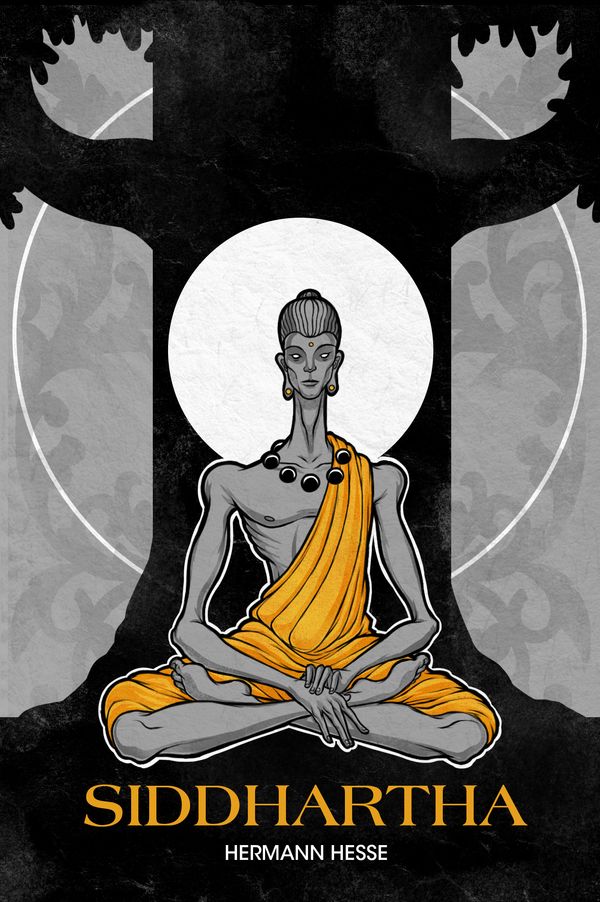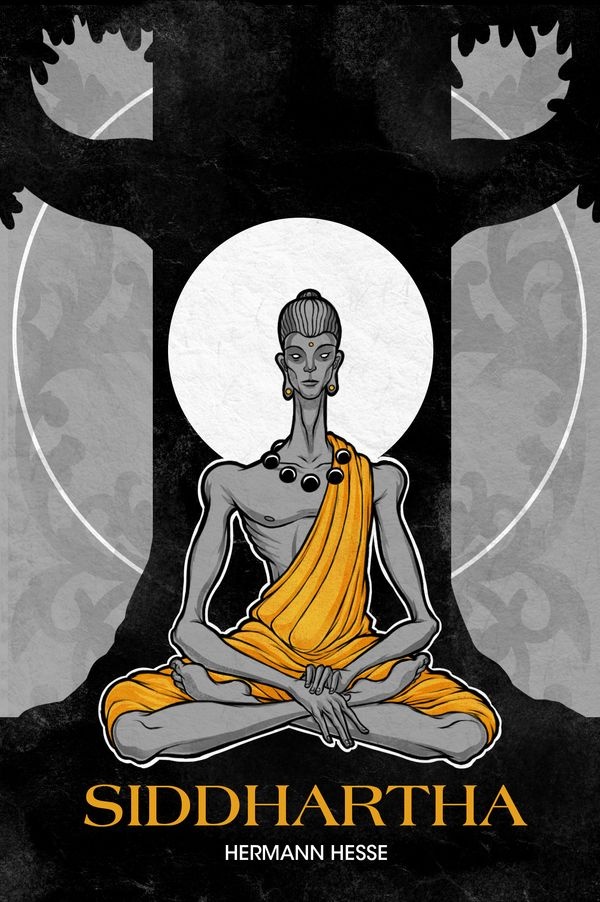

Aniketh Vijesh
Siddhartha - Herman Hesse

What it is
Siddhartha is a book by Herman Hesse. The main focus as the title of the books suggests is about a man named Siddhartha and follows his very incredible and interesting journey leading to his eventual awakening and eventual ascension into enlightenment.
The main question of the book
The main question of the book is, "Even though hundreds of people across hundreds of texts have attained enlightenment and they provide various philosophical theories and ideas but no one actually tells what it is like to be enlightened. So is there any truth to what they say? Is there any point in accepting them? Is there a way to rid oneself of this so called ego?"
The book answers all of these questions eventually in the form of the titular charaters growth and eventual attainment of liberation.
The contents
The book starts off by describing how perfect of man Siddhartha is. He is a handsome man, well learned and a master of Vedas . He makes everyone fall in love with him with his mere presence. In one line of the book he is described or hailed as the Price of Brahmins.
All seems well but inside him grows a void. A void of confusion. He is not happy. He is has been taught about the [[Atman]] , and how none of the learned scholars of yore have ever witnessed or felt it (this is a conclusion he reached because he cannot find evidence of prescribed path to become one with the atman). Thus he sets off on a journey to find what the atman truly is.
The first phase of this journey is him going on to join the shrmanas a group of eccentric rishis.
He undergoes a strict regime of abstinence and seemingly macabre steps or activities, pushing his body to its physical and spiritual limits. the main aim of these exercises? To nullify the self , to nullify the ego and subdue it so all that exists is a void.
One day as they are begging for alms they come across people talking about an enlightened being, The perfect one, The Buddha. Siddhartha is curious and sets out to find the Buddha and talk to him, if someone ought to have a solution or a map towards hos journey who else better than this living master.
He after weeks of journeying finally meets the Buddha and poses his questions, to which The Buddha smiles and replies in a mysterious way, almost chastising him for seeking so much knowledge. Siddhartha is confused by the Buddha's words but is still very much in love with the being called Buddha for he truly was an enlightened being.
This interaction stir something within Siddhartha. A sudden realisation of what he has been doing and as the chapter title indicates, it is the awakening of the main known as Siddhartha. He realises that one must be ready to see everything as a whole. The universe is within everything and everything is the universe. Another profound realisation that Siddhartha is the realisation that to attain true knowledge one must first understand oneself. The ego Siddhartha was trying to kill but always sprang up again was the not the obstacle but it wan in fact the way towards the truth.
The next phase of Siddhartha's life takes a very odd turn and it is his decent into vice and sin. The following chapters show how Siddhartha indulges in luxuries and sin and eventually loses his way. All that he had gained, all his powers, all his knowledge, gets systematically destroyed by the pleasures of the world. By the time he realises what has happened to him, he is an old man. An old frail man. He looks into the mirror and sees a very familiar visage, the face of is old father. It is now his face. Everyday Siddhartha tries to come out of this world of vice, promising to stop tomorrow. But tomorrow never comes for him. And one night he has a breakdown. This results in him sitting under a mango tree reminiscing about his younger days. This results in him reaching a consensus and he leaves the city in the dead of the night without informing anyone. He ends up near a river and plunges into it. His aim is simple, to take his own life for he fed up with this world. But in the midst of his attempt, something clicks in him, From within himself a sound emerges as if to save his life. The voice which had been silenced buy years of sin had resurfaced. The powerful word "OM" is cast throughout his being. He waked up a few hours or days later downstream, unscathed. He wakes up as a new man. He describes himself as a child. He is no linger bound by his ego and realises that his ego had in fact died and he born a new.
He then travels downstream to find the hut of an oarsman, whom he had met years ago. They talk to each other about the nature of life and the oarsman himself asks Siddhartha to listen to the river. The river in his mind is the ultimate teacher. And the rive truly is a master teacher. It helps Siddhartha many times and in context of the book, represents the universe and time itself.
The river is present everywhere at the same time, may it be in the form of the sea, a brook a waterfall or the underground water. The river exists everywhere and hence is like time. According to the philosophy of the book the river is the ultimate representation of life and is a reflection of the nature of life. It is during this segment and the following chapters that the true philosophical ideas of the book are expressed.
My thoughts on the book
The book is very insightful and it is very relatable. When we are young we have no identity and we learn and ingrain our ego into ourselves. Along the way we pick up good and bad habits, we fall into addictions, we find people worth loving, we find ideas to die for and so on. Siddhartha also goes along this journey and it is rather interesting to see a person's life put in front of us in a such a raw manner. We witness him wrestling with guilt and disappointment every night after committing sin and it is indeed how addiction works. The one thing which hurts a person suffering from any type of addiction is the eventual feeling of dread and remorse that comes after sin. It is a kind of pain which eats away at a person from the inside, destroying his or her self confindence. A rather significant portion of the book is given to this phase of Siddhartha's life, we see him go through all of these and we witness him eventually rise above all of them and attain true peace.
Infact, Siddhartha is reborn after his meeting with the Buddha. In that state he truly looks around the world as if he is a child, he experiences the death of his ego, a clean slate. After which he goes on living his life as any other man, indulging in sin and life as a whole. Finally after years of getting his soul eroded into a smothered flame of his inferno like re-birth, we see his ascension, the rekindling of his soul to the greater meanings of life.
Another point which I believe is very crucial to the whole book is that anyone can attain enlightenment. All actions when done with conviction and understanding and love will evolve into it's own kind of meditation. Nature, man, boat, forest, stream everything has the potential to become the sourse of enlightenment.
At its heart, Siddhartha is a novel about the search for meaning in life. Hesse's writing is poignant and evocative, capturing the full range of human emotion and experience. Through the character of Siddhartha, he offers a powerful message about the importance of self-discovery and the pursuit of personal truth. Ultimately, this novel is a testament to the power of the human spirit and the capacity for redemption and transformation.
One of the remarkable aspects of the book is its ability to convey the idea that true wisdom cannot be found in books or teachings alone, but through personal experience and introspection. Hesse's use of simple, yet powerful imagery, such as the river that Siddhartha crosses multiple times throughout the novel, serves as a metaphor for the constantly changing nature of life and the importance of staying in the present moment. The river is a symbol of the continuous flow of life, and Siddhartha learns to appreciate the beauty of each moment, rather than dwelling on the past or obsessing over the future.
Moreover, the novel also touches on the idea of the cyclical nature of life. Siddhartha's journey is a reflection of the cycle of life and death, rebirth and renewal, and the constant struggle to find meaning and purpose in a world that can often seem chaotic and uncertain. Hesse's portrayal of Siddhartha's journey is both poignant and thought-provoking, forcing readers to confront their own beliefs about the nature of existence.
Overall, Siddhartha is a deeply moving and philosophical novel that offers a fresh perspective on the quest for spiritual enlightenment. Hesse's beautiful prose, combined with his deep understanding of human nature, makes this book a must-read for anyone searching for meaning and purpose in their own lives.

Aniketh Vijesh
Third-year student @Amrita Vishwa Vidhyapeetam studying B.Tech CSE AI. I work on medical AI, and build cool AI projects!